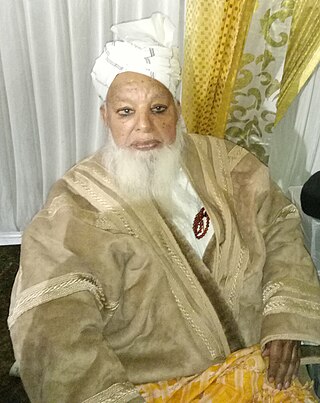
The Barelvi movement, also known as Ahl al-Sunnah wa'l-Jamaah is a Sunni revivalist movement following the Hanafi and Shafi'i schools of jurisprudence, and Maturidi and Ashʿari schools of theology with strong Sufi influences and with over hundreds of millions of followers in South Asia and also in parts of Europe, America and Africa. It is a broad Sufi-oriented movement that encompasses a variety of Sufi orders, including the Chistis, Qadiris, Soharwardis and Naqshbandis as well as many other orders and sub-orders of Sufism. They consider themselves to be the continuation of Sunni Islamic orthodoxy before the rise of Salafism and Deobandi Movement.
Muhammad Rafi Usmani was a Pakistani Muslim scholar, jurist and author who served as the President of Darul Uloom Karachi. He was an alumnus of Darul Uloom Deoband, University of the Punjab and the Darul Uloom Karachi. He authored books including Ahkām-e-Zakāt, Al-Tālīqāt al-nāfi'ah alā fath al-mulhim, Islām mai aurat ki hukmrāni and Nawādir al-Fiqh. He was a syndicate member of the University of Karachi, vice-president and a member of the executive council of Wifaq-ul-Madaris. His brother Muhammad Taqi Usmani is also a senior scholar.
The Sultan ul Madaris Urdu: سُلطان المدارس; is a Shia Islamic Madrasa for higher religious education in Lucknow, India. Major course of studies include Jurisprudence, Theology and Islamic Literature.

Jamia Nizamia more properly, Jami'ah Nizamiyyah, is one of the oldest Islamic seminaries of higher learning for Muslims located in Hyderabad, India. It is named after its founder- the 7th Nizam of Hyderabad.

Syed Aqeel-ul-Gharavi also known as Ayatullah Aqeel-ul-Gharavi is a leading Indian Twelver Shia scholar, philosopher, thinker, writer, poet, educationist, community activist, critic and a mujtahid. Presently, Aqeel-ul-Gharavi is acknowledged as one of the famous and senior Shia scholars from the Indian Subcontinent. He was the principal of Hawza-e-Ilmia Jamia-tus-Saqalain, Delhi and is the current chairman of Safinatul Hidaya Trust, India. He is the vice-President of All India Muslim Majlis-e-Mushawarat and member of All India Muslim Personal Law Board. Syed Aqeel is also a member of the Majma Jahani Ahlulbayt, Iran. Gharavi supervises PhD students at the Aligarh University, India. In addition to all of these, he also serves as patron of Imamia Islamic University, Delhi and secretary of Forum of Philosophers, India.
Zujajat al-Masabih (English: Lanterns glass) is a compendium of Hadith that supports the Sunni Hanafi school of thought in Islam. The book is compiled into five volumes and contains a total of 6634 Ahadith. Authored by Hazrat Abdullah Shah Naqshbandi Alaihirrahmah, the Zujajat was first published in 1960.

Grand Ayatollah Shaikh Muhammad Hussain Najafi was a Pakistani Twelver Shia Marja. Muhammad Hussain Najafi was running a Hawza in Sargodha. Najafi was included in all the editions of "The Muslim 500: The World's Most Influential Muslims" since 2010. He is one of the nine marja's mentioned in the most recent edition.

Syed Safdar Hussain Najafi was a scholar and religious leader.

Syed Shuja’at Ali Qadri was the first Grand Mufti of Pakistan, Judge of Federal Shariat Court, a member of the Pakistani Council of Islamic Ideology, and a scholar of Islamic Sciences and modern science. He was influenced by Mustafa Raza Khan Qadri.
Shaykh Ul Islam Imam Muhammad Anwaarullah Khan Farooqui is the founder of the Islamic university Jamia Nizamia, Hyderabad. His actual name is Muhammad Anwaarullah Farooqui and was bestowed the title of "Fadheelat Jung" by the Nizam.

Darul Uloom Jamia Nizamia Ghousia is an Islamic seminary for Sunni Muslims. It was established by Mohammad Abdul Ghafoor Hazarvi, where he served as the Mohatmim and Grand Mufti. His son Mufti Abdul Shakoor Hazarvi took over as Mohatmim until April 2010. The Jamia is known for the great Ulama and Huffaz of Quran and Hadith it produced. It continues the tradition of the Darul uloom system initiated by Darul Uloom Bareily.
Abul Wafa Al Afghani, also known as Abu Wafa Al Afghani, was a renowned Persian astronomer and mathematician. He was born in 940 CE in the province of Khorasan, which is now part of modern-day Iran.

Mustafa Raza Khan Qadri (1892–1981) was an Indian Sunni Muslim scholar and author, and leader of the Sunni Barelvi movement following the death of its founder, his father Ahmed Raza Khan. He was known as Mufti-Azam-i-Hind to his followers. In a biography compiled by Muhammad Afthab Cassim Razvi he is referred to as Mufti-e-Azam-e-Hind.
Aziz-ul-Rahman Usmani was an Indian Sunni Muslim scholar who served as first Grand Mufti of Darul Uloom Deoband. He is best known for his Fatawa Darul Uloom Deoband. His brother was Shabbir Ahmad Usmani.
Khair Muhammad Jalandhari was a Pakistani Islamic scholar, founder and first rector Jamia Khairul Madaris. He served as president and vice-president of Wifaq ul Madaris Al-Arabia, Pakistan.
Muhammad Sahool Bhagalpuri was an Indian Muslim scholar and jurist who served as the fifth Grand Mufti of Darul Uloom Deoband.

Mufti Abdul Razzaq was an Indian Muslim scholar, mufti and an activist of the Indian independence movement, who served as the ninth general secretary of the Jamiat Ulama-e-Hind. He was the vice-president of Jamiat Ulama-e-Hind's Arshad faction. He established the Madrasa Jamia Islamia Arabia in Bhopal.
Habībur Rahmān Khairābadi is an Indian Muslim scholar and jurist who serves as a Mufti at the Darul Uloom Deoband. He is an alumnus of Darul Uloom Mau, Mazahir Uloom and the Aligarh Muslim University. He has authored books including The Rules of Slaughter and The Importance of Zakat. He signed the Darul Uloom Deoband's first ever religious edict against terrorism in 2008.
Nizamuddin Azami was an Islamic scholar who served as the twelfth and last Grand Mufti of Darul Uloom Deoband. He made contributions in Islamic jurisprudence, and his works include Muntakhabat-e-Nizām al-Fatāwa, a collection of selected fatwas he wrote during his tenure at Deoband.






